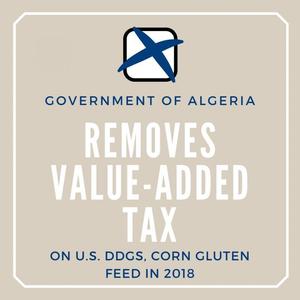Algeria removes value-added tax on US DDGS, corn gluten feed

U.S. Grains Council
January 23, 2018
BY U.S. Grains Council
The government of Algeria has lifted a value-added tax (VAT) on U.S. distillers dried grains with solubles (DDGS) and corn gluten feed (CGF) for 2018, affording new opportunities this marketing year.
"The U.S. Grains Council (USGC) has been demonstrating the clear advantages of using DDGS and CGF in feed rations through activities in Algeria,” said Ramy Hadj Taieb, USGC regional director for the Middle East and North Africa. “This success was made possible thanks to efforts deployed by the council and our various partners in Algeria.”
Algeria is the second largest corn market in North Africa, second only to Egypt. The poultry and dairy sectors are growing industries where U.S. coproducts fit well into rations. However, a complex environment and government influence on the economy complicates market development efforts.
For the last two years, the Algerian government has imposed regulations and made decisions to restrict imports in order to offset the persistent drop in international oil and gas prices. That included a 17 percent VAT on both U.S. DDGS and CGF. Combined with existing import duties of 30 percent, imports of these products were simply uncompetitive with other feed ingredients.
However, thanks to work by the council and partners in country to push for a reduction in tariffs, the Algerian government released a list of feed ingredients benefiting from an exoneration of a value-added tax until Dec. 31, 2018. The list notably includes corn, barley, DDGS and CGF, a particular success in this economical context.
“The difference of cumulated import and value-added tax tariffs has considerably narrowed, especially when compared to competing feed ingredients,” Taieb said. “This situation offers new and interesting import perspectives for U.S. co-products in Algeria as the council continues to promote the value of U.S. DDGS and CGF in improving feed conversion rates.”
While the exemption from the value-added tax is a success, U.S. DDGS and CGF are still subject to import duties of 30 percent, compared to 5 percent for both corn and soybean meal. As a result, the council will continue efforts to bring these import duties in line with other feed ingredients as well as to demonstrate the value of utilizing U.S. DDGS and CGF in poultry and dairy feed rations to Algerian producers.
Learn more about the council’s work in North Africa here.
Advertisement
Advertisement
Advertisement
Advertisement
Related Stories
The U.S. Department of Energy’s Office of Energy Efficiency and Renewable Energy is soliciting public comments on a preliminary plan for determining provisional emissions rates (PER) for the purposes of the 45Z clean fuel production credit.
On July 17, Iowa’s cost-share Renewable Fuels Infrastructure Program awarded $1.12 million in grants for 20 applicants to add B11 and 4 applicants to add E15 to retail sites. This was the first meeting following the start of RFIP’s fiscal year.
Par Pacific Holdings Inc., Mitsubishi Corp. and ENEOS Corp. on July 21 announced the signing of definitive agreements to establish Hawaii Renewables LLC, a joint venture to produce renewable fuels at Par Pacific’s refinery in Kapolei Hawaii.
A new study published by the ABFA finds that the U.S. EPA’s proposal to cut the RIN by 50% for fuels made from foreign feedstocks, as part of its 2026 and 2027 RVOs, could stall the growth of the biomass-based diesel (BBD) industry.
The European Commission on July 18 announced its investigation into biodiesel imports from China is now complete and did not confirm the existence of fraud. The commission will take action, however, to address some systemic weaknesses it identified.
Upcoming Events










